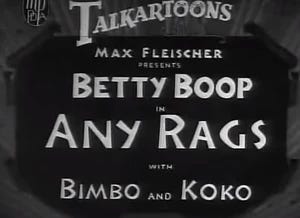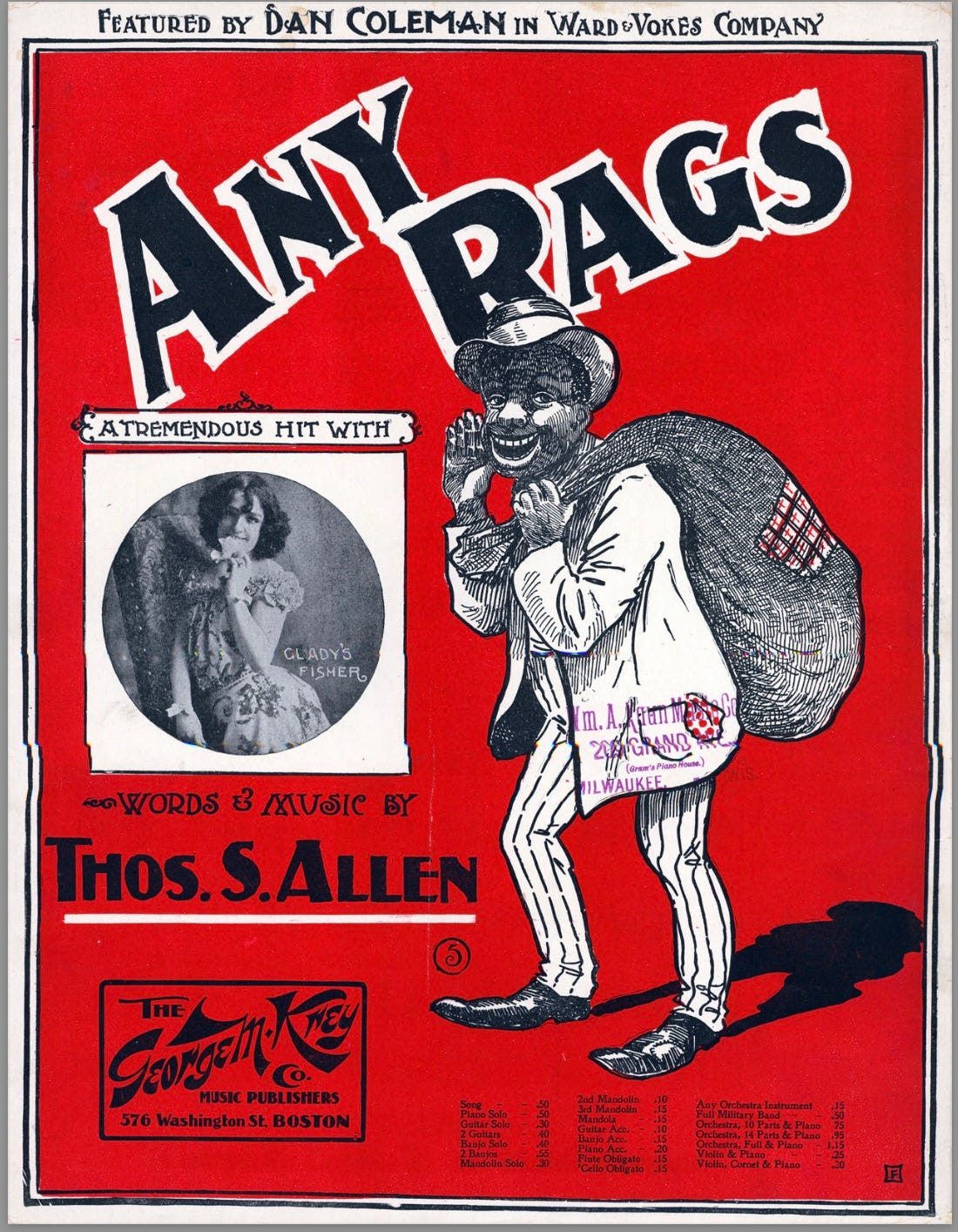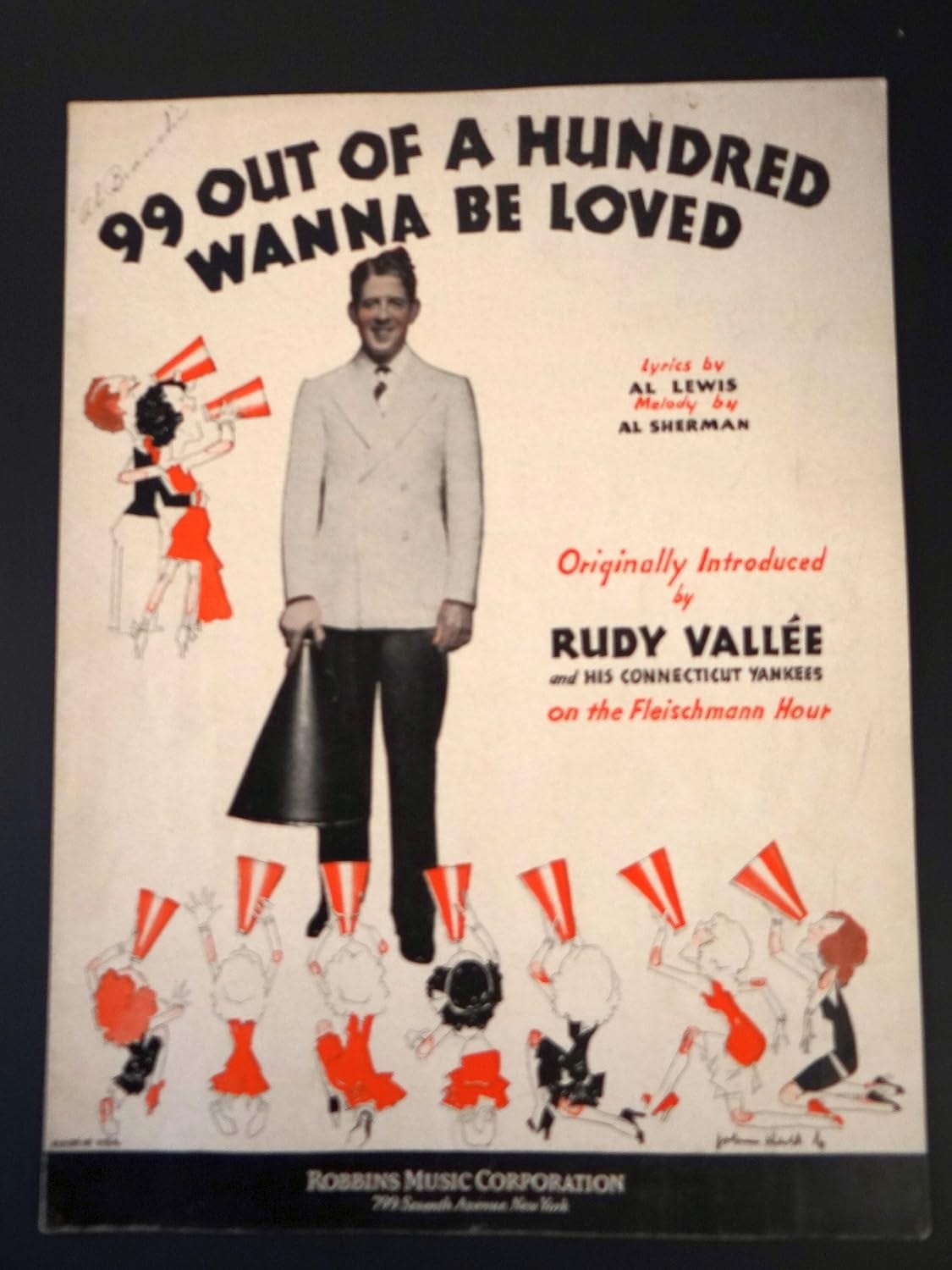ANY RAGS? (1932): Part 1 of 2, “Trash of the Titans”
Another Mondo Bizzaro Hot Jazz Classic Cartoon
While Halloween was an appropriate day to re-watch and re-consider Swing You Sinners! (1930), along the way I took another look at Any Rags (1932) and realized that this one is just as strange and bizarrely ethnic, and also uniquely suited to the era of the Great Depression. (Typically of me, I started out to write maybe 500 words about Any Rags, then I next time looked up, I had written well over 2000 words… so maybe I’ll break this into two parts.)
Any Rags speaks to a time, before WW2, when street culture was a real and vibrant thing. At some point, I’m going to do a whole Sing! Sing! Sing! Show and an accompanying SubStack about this long-gone phenomenon - today they would describe it as a “grass roots ecosystem” or some other kind of millennial-speak - as depicted in popular songs.
There were all kinds of tradesmen, starting with vendors - most famously in “Yes! We Have No Bananas” and “The Peanut Vendor.” There were also shopless, transient repair men who did business on the street, such as “The Umbrella Man,” whose cry is “any umbrellas to fix today?” and “Scissor Grinder Joe,” famously recorded by Cook's Dreamland Orchestra with the legendary cornetist Freddie Keppard. There are at least two songs about lamplighters, Hoagy Carmichael’s “The Lamplighter’s Serenade,” famously recorded by Frank Sinatra, and “The Old Lamplighter.” The latter, by Nat Simon and Charlie Tobias, was a hit for Kay Kyser and Merv Griffin in 1946, by which time this entire culture was already receding into the sentimental mists of memory.
“Any Rags,” both the song and the cartoon, reflects the days before everything was disposable, when junk and garbage were actively traded commodities. Judging by the coverage of popular songs, you would think that junkmanship was a major occupation. “Junk Man Blues” (1931) by Red Nichols, recorded by the trumpeter leader with Johnny Scat Davis singing, also by Leo Watson and the The Spirits of Rhythm and Lew Stone with Al Bowlly, quotes “Any Rags,” and there was also Frank Loesser’s “Junk Man,” and later Dinah Washington sang “I Sold My Heart to the Junk Man.” (Rest assured, I’m going to return to this theme in the near future, to offer an authoritative history of musical garbage.)
# # #
The 1932 Betty Boop cartoon Any Rags is the rare movie of any kind of the period to illuminate this particular kind of Great Depression ethos. Here, the main character is Betty’s sometime leading man - if an anthropomorphic dog can be a “leading man” - Bimbo. The cartoon takes its story, title, and its cue from the 1902 popular song “Any Rags.” Bimbo is not a garbage man or a trash collector - or “waste management specialist” in the contemporary lingo - but clearly a businessman who derives profit both from hauling away other people’s trash as well as reselling and repurposing anything that happens to be of value.
Here are the original lyrics:
Did you ever hear the story of Ragged, Jagged Jack?
Here he comes down the street with a pack on his back.
He comes in the morning, and he comes at night,
And he gobbles up ev'ry thing in sight.
He wakes up the neighborhood for miles around
He's a regular alarm clock, always wound.
He gets beneath your window when you try to get to sleep
And yells in a voice so loud and deep:Any rags ladies? (No, no rags today)
All right ladies.
Any rags? Any rags?
Any rags, any bones, any bottles today?
There's a big black rag picker coming this way,
Bimbo diligently marches through the neighborhood gathering garbage. Very aggressively - in fact, a mite too aggressively. In fact, he’s so eager to amass trash that he grabs just about everything that isn’t nailed down, including the clothing off several hapless individuals, even as they’re wearing it, as well as the stripes off a barber’s pole as he passes by. He throws all the stuff on his junkman’s cart, first collecting all the bits and pieces and odds and ends and then, eventually, auctioning it off to a crowd of onlookers, including Betty Boop. (At one point she gazes down at him from her window, and the top of her dress keeps rolling down - revealing lacy lingerie - in a manner that directly anticipates Harvey Kurtzman and Little Annie Fanny.)
There are three major themes heard throughout: The first is the 1902 “Any Rags,” described as a “ragtime schottische,” by Thomas S. Allen. It’s the kind of old vaudeville song that the Fleischers might have grown up with, and that everybody would have known, even though it was then 30 years later. Kay Kyser even did a swing version in 1936. “Any Rags” is the tune that Bimbo chants throughout.
Any rags? Any rags?
Any rags, any bones, any bottles today,
It's the same old story, in the same old way.
Arthur Collins - Any Rags
But there’s a different song used to underscore his actual rag picking. This is “Ninety-Nine Out of a Hundred Want to Be Loved,” by two guys named Al, Al Lewis and Al Sherman, the latter being the father of the two more famous Sherman Brothers, Richard M. and Robert B. Even as the younger Shermans wrote all the major Disney musicals of the 1960s, it would seem that cartoon composing ran in that family. “Ninety-Nine Out of a Hundred Want to Be Loved” is not a particularly substantial piece of songwriting; it came and went fairly quickly in 1931. “Ninety-Nine” has the distinction of being recorded twice on two consecutive days by Benny Goodman, once as one of the early Melotone recordings under his own name, and then as a sideman and soloist with Ben Selvin’s Orchestra. (The Selvin version actually has a better hot solo by BG.) It’s one of the rare tunes of the period in a strict march tempo, which doesn’t really do much for its status as a love song. However, the distinctly unromantic rhythm does make for a jaunty little number for Bimbo’s purposes. It could have been used on an album titled Music to Gather Garbage By.
to be continued in part 2, which will talk about Luis Russell’s “Call of the Freaks” and Snooks and his Memphis Ramblers.
Very Special thanks to the fabulous Ms. Elizabeth Zimmer, for expert proofreading of this page, and scanning for typos, mistakes, and other assorted boo-boos!
Sing! Sing! Sing! : My tagline is, “Celebrating the great jazz - and jazz-adjacent - singers, as well as the composers, lyricists, arrangers, soloists, and sidemen, who help to make them great.”
A production of KSDS heard Saturdays at 10:00 AM Pacific; 1:00PM Eastern.
To listen to KSDS via the internet (current and recent shows are available for streaming.) click here.
The whole series is also listenable on Podbean.com, click here.
Four Episodes of Sing! Sing! Sing on KSDS (88.3 San Diego) spotlighting the life and legacy of Tony Bennett:
SSS 59 2023-08-12 Tales of Tony
SSS 58 2023-08-05 Tony Bennett sings the George & Ira Gershwin Songbook
SSS 57 2023-07-29 Tony Bennett - Van Heusen, Burke, Cahn, Styne, Sondheim, Comden & Green
SSS 5 2022-07-30 Tony Bennett @ 96: The Johnny Mercer Songbook
SLOUCHING TOWARDS BIRDLAND is a subStack newsletter by Will Friedwald. The best way to support my work is with a paid subscription, for which I am asking either $5 a month or $50 per year. Thank you for considering. Word up, peace out, go forth and sin no more!
Note to friends: a lot of you respond to my SubStack posts here directly to me via eMail. It’s actually a lot more beneficial to me if you go to the SubStack web page and put your responses down as a “comment.” This helps me “drive traffic” and all that other social media stuff. If you look a tiny bit down from this text, you will see three buttons, one of which is “comment.” Just hit that one, hey. Thanks!







Coney Island Washboard and Window washer man: Mills Brothers
The Fleischers were very adept at adopting and utilizing the popular culture of their time, and their films show that.
I have to wonder who that one guy who doesn't want to be loved is, though.